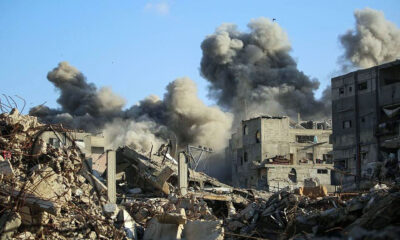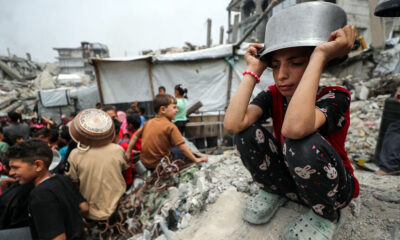International
Relief as Palestinian medical evacuees leave Gaza
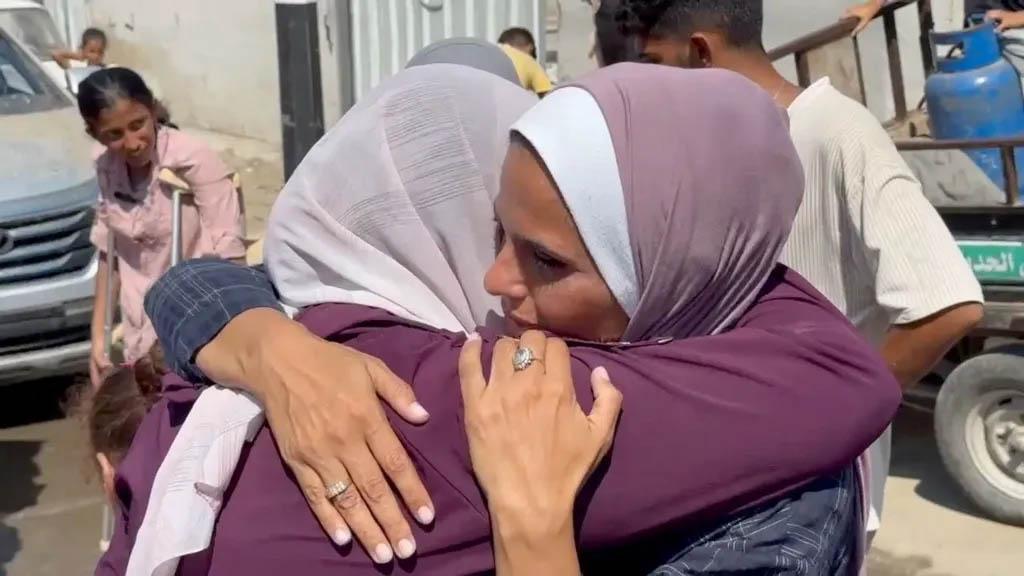
Relief as Palestinian medical evacuees leave Gaza
Injured and critically ill Palestinians are on their way from Gaza to the United Arab Emirates for treatment, the World Health Organization (WHO) says, in the largest single medical evacuation since the war began following the brutal Hamas attack on southern Israel on 7 October.
Later on Tuesday the WHO said 85 sick and severely injured patients from Gaza had been evacuated to Abu Dhabi.
The sweeping Israeli military operations that followed have wrecked Gaza’s healthcare system.
And the main route for medical evacuees through Gaza’s Rafah border crossing with Egypt was shut down after the Israeli military took control there in early May.
The WHO says so far some 5,000 Gazans have received treatment outside of the territory, but another 10,000 still need to leave.
This latest group began to gather on Sunday at pickup points for transport to a central location before departing.
In the central city of Deir al-Balah the bus station was crowded with patients and their families.
“I call on the whole world to look at us with compassion,” said Shaza Abu Selim, who was pushing her daughter, Lamis, in a wheelchair. The young girl needs major surgery for scoliosis, which has been delayed now by six months. She barely moved, her face stained with tears and exhaustion.
“I could not believe it when they contacted me [to say] that my daughter was among those on the list going outside Gaza for treatment,” said her mother. “I do not know when the war will end… and may God make it easy and heal everyone.”
Even before the conflict some Gazans got care outside the territory because the health system wasn’t equipped to deal with complex medical conditions.
But Israeli bombardments have closed hospitals, killed doctors, blocked medicines, and overwhelmed remaining facilities with casualties.
READ ALSO:
- Hamas chief Ismail Haniyeh assassinated in Iran
- Paris 2024: Egypt shock Spain 2-1 in football, qualify for quarterfinal
- Tinubu approves N50,000 monthly stipend for Niger-Delta youths
Nasima al-Ajeel’s story encapsulates the misery and desperation this has caused.
“We were struck” she says. “My eldest son was killed, my father was killed, my youngest son, Asser, lost his sight.”
Ms al-Ajeel is sitting and holding little Asser, his eyelid closed over an empty socket. Her leg is wrapped in bandages.
“His left eye was blown out with a skull fracture,” she said. “My middle son suffers from a leg injury and leg deformities, and I suffer a skull fracture, blindness in my left eye, and a broken shoulder and ribs.”
The Israeli army says it has discovered Hamas combatants and infrastructure inside hospitals and health clinics, something the militant Islamist movement, which controlled Gaza before the war, denies.
But human rights activists have accused Israel of obstructing medical evacuations.
Physicians for Human Rights in Israel and other groups filed a petition in Israel’s High Court of Justice in early June after the Rafah crossing was closed.
Since Israeli forces captured the border area at the start of their ground operation there two months ago, Egypt has refused to reopen the crossing, the only route out of Gaza that does not lead into Israel and previously a main exit point for fleeing civilians and a major channel for aid.
READ ALSO:
- Hardship global issue, don’t destroy public assets, Ooni tells Nigerians
- Studying in France: 3 visa categories students from Nigeria need to know
- Despite being unmarried, Telegram CEO says he has over 100 biological children
Egyptian officials have insisted that the Gazan side of the crossing must be returned to Palestinian control.
As a result of the court action, the Israeli government committed to establishing a permanent mechanism for allowing regular medical evacuations.
But it has yet to do so, and on Sunday it announced it was cancelling the expected evacuation without saying why.
The Kan public broadcaster reported that Prime Minister Benjamin Netanyahu had made the decision himself, following a deadly Hezbollah attack in the Israeli occupied Golan Heights at the weekend which killed 12 children and teenagers.
That seems to have been quickly reversed. Azza Ahmed Kafarneh, a 57-year-old mother and grandmother suffering from cancer, told the BBC that the patients had prepared to go back home on hearing the news, but were told to stay because “there is a big potential that they will agree for you to leave”.
Nothing is certain in this war, and for those fortunate enough to escape it, the goodbyes are bittersweet.
Sarah Marzouk, a 12-year-old girl who says she lost her foot when her neighbour’s house was bombed, was wiping away tears at the bus station on Sunday.
“I wish that the war would end and that all children like me would be able to come with me and have artificial limbs fitted and receive treatment abroad,” she said. “I also hope that I will return to see my father in peace.”
Ms Ahmed Kafarneh said she wouldn’t leave if she didn’t feel so sick. She hasn’t heard of any medical evacuees who’ve returned to Gaza.
“I am confused between leaving my family and going out to get treated,” she said. “And things maybe will take a longer time and the war maybe will take a long time and things might get worse. Nobody knows.”
Relief as Palestinian medical evacuees leave Gaza
BBC
International
US Adds 19 More Nigerians to ‘Worst of the Worst’ Deportation List

US Adds 19 More Nigerians to ‘Worst of the Worst’ Deportation List
The United States government has added 19 more Nigerian nationals to its “worst of the worst” criminal aliens list, bringing the total number of Nigerians scheduled for deportation to 113. The move targets convicted criminals who have served time in U.S. courts and are deemed a threat to public safety.
According to the U.S. Department of Homeland Security (DHS), the newly listed Nigerians were convicted of serious crimes, including sexual assault on a minor, fraud, assault, drug trafficking, and money laundering. These individuals were arrested by U.S. Immigration and Customs Enforcement (ICE) and will be deported after completing immigration procedures.
A DHS statement highlighted the purpose of the programme:
“The U.S. Department of Homeland Security is highlighting the worst of the worst criminal aliens arrested by U.S. Immigration and Customs Enforcement. Under Secretary Kristi Noem’s leadership, ICE is carrying out deportations — starting with the worst of the worst.”
READ ALSO:
- Gunmen Storm Gbugbu in Kwara, Residents Flee as Panic Spreads
- FG to Launch Monthly Revenue Transparency Dashboards to Improve Fiscal Accountability
- Troops Repel Coordinated Attacks in Borno, Kill 25 Terrorists, Soldier Dies
Among those newly added to the list are Adeolu Solabu, Oladayo Agboola, Chinonso Ochie, Oluchi Jennifer Chimdimma Chime, Samuel Omorodion, Sunday Adediora, Sunday Kunkushi, Mkpouto Etukudoh, as well as Marcus Unigwe, Kehinde James, Blessing Uchanma, Victor Adebisi, Richard Ugbah, Olaniyi Ojikutu, Oluwamuyiwa Olawoye, Okechukwu Amadi, Femi Jolayemi, Anthony Asanya, Izuchukwu Okoye, and Ebele Agbasiele.
This latest addition follows a previous announcement in which 79 Nigerian nationals had already been slated for deportation for offences ranging from fraud, manslaughter, assault, robbery, to drug-related crimes. The combined total of 113 Nigerians reflects the U.S. government’s intensified focus on criminal aliens.
The move has sparked renewed discussion about U.S. immigration enforcement, diplomatic engagement with Nigeria, and the rights and welfare of deportees. Advocates have raised concerns about ensuring due process and humane treatment for those returned to Nigeria, while authorities stress that deportation is a legal measure targeting foreign nationals convicted of serious crimes.
Globally, Nigerians have faced similar deportation measures, including large-scale removals from countries like India, where thousands were repatriated for visa violations or alleged criminal activities. The ongoing deportations underscore the challenges facing Nigerian citizens abroad amid tightened international immigration and law enforcement policies.
US Adds 19 More Nigerians to ‘Worst of the Worst’ Deportation List
International
Armed Man Shot Dead at Trump’s Mar‑a‑Lago Residence by Secret Service
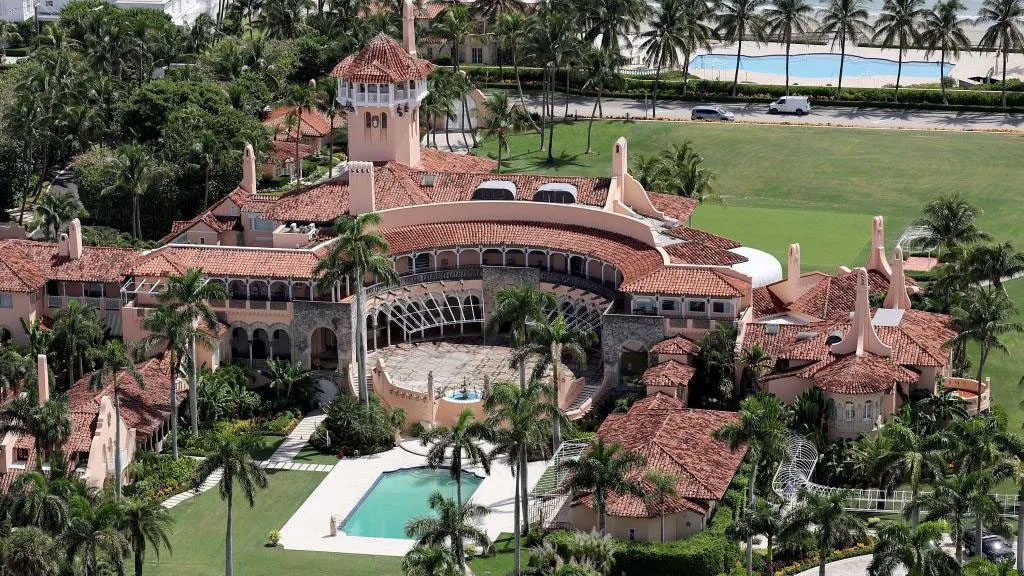
Armed Man Shot Dead at Trump’s Mar‑a‑Lago Residence by Secret Service
An armed man was shot and killed early Sunday after breaching the secure perimeter of Donald Trump’s Mar‑a‑Lago residence in Palm Beach, Florida, the United States Secret Service confirmed. The incident occurred around 1:30 a.m. ET (06:30 GMT) while Trump and First Lady Melania Trump were in Washington, D.C.
Authorities said the suspect, later identified as Austin Tucker Martin, a 21-year-old from Cameron, North Carolina, was carrying a shotgun and a fuel canister when confronted by Secret Service agents and a Palm Beach County sheriff’s deputy. Officers ordered him to drop the items, but he raised the shotgun toward them, prompting them to fire and neutralise the threat. No law enforcement officers were injured in the incident. Martin’s family had reported him missing hours before the shooting. Moore County authorities said the missing-person report was turned over to federal investigators. Officials are examining whether he acquired the firearm during his drive from North Carolina to Florida. A box for the shotgun was later recovered from his vehicle.
READ ALSO:
- Women, Children Killed as Pakistan Launches Overnight Strikes on Afghanistan
- 2027 Elections: IPOB Vows to Resist APC Godfatherism in Abia
- FG Arraigns Abuja Pastor-Doctor Over Alleged ₦19m Fraud, Sale of Embryos
Palm Beach County Sheriff Ric Bradshaw described the encounter: the suspect dropped the fuel can but lifted the shotgun into a threatening position. “At that point, agents fired their weapons to neutralise the threat,” Bradshaw said. Officers involved were equipped with body cameras, which captured the incident. The FBI is leading the investigation with support from the Secret Service and local law enforcement. Officials are analyzing bodycam footage, gathering evidence, and creating a psychological profile of the suspect. Authorities have yet to determine a motive.
Mar‑a‑Lago is heavily guarded, with an outer cordon maintained by local Palm Beach deputies and an inner perimeter secured by the Secret Service. Visitors are screened, and vehicles and bags are checked with metal detectors and sniffer dogs. The shooting adds to a history of threats against Trump. In July 2024, Trump was grazed by a bullet at a rally in Butler, Pennsylvania, where one bystander was killed and two others injured. Another would-be assassin, Ryan Routh, attempted an attack at Trump International Golf Club in West Palm Beach and was recently sentenced to life in prison. Following the Mar‑a‑Lago shooting, Secret Service Director Sean Curran traveled to Florida to oversee “after-actions” and reinforce operational communication and response protocols.
Political violence has become a prominent topic in the US. Treasury Secretary Scott Bessent criticized what he described as “normalizing violence” in politics, referencing previous assassination attempts and recent high-profile attacks, including the public shooting of right-wing activist Charlie Kirk and the fatal shootings of a Democratic lawmaker and her husband in Minnesota. The FBI and Secret Service are continuing the investigation to determine the suspect’s motive and possible affiliations, with authorities pledging to release updates as more information becomes available.
Armed Man Shot Dead at Trump’s Mar‑a‑Lago Residence by Secret Service
International
Women, Children Killed as Pakistan Launches Overnight Strikes on Afghanistan
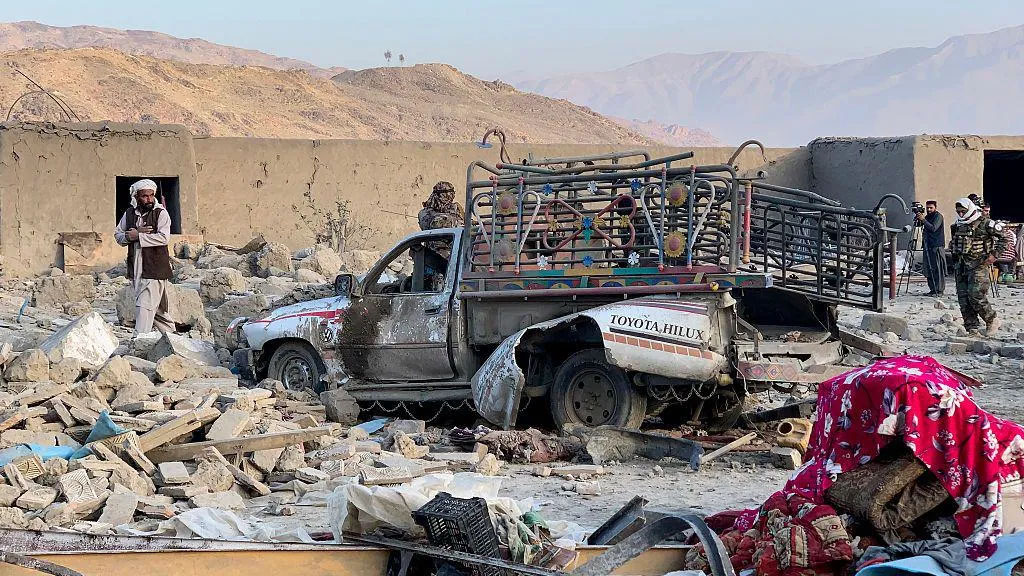
Women, Children Killed as Pakistan Launches Overnight Strikes on Afghanistan
Pakistan has carried out deadly overnight airstrikes on Afghanistan, killing at least 18 people, including women and children, according to the Afghan Taliban, in a major escalation of Pakistan–Afghanistan tensions along their volatile border.
Islamabad confirmed that the operation involved precision airstrikes against seven alleged militant camps and hideouts close to the Pakistan–Afghanistan border, saying the attacks were launched in retaliation for recent suicide bombings inside Pakistan. Pakistani officials said the strikes were intelligence-based and aimed at eliminating armed groups accused of orchestrating cross-border attacks.
The Taliban government in Afghanistan strongly condemned the strikes, accusing Pakistan of bombing civilian homes and a religious school. Afghan authorities described the attacks as a violation of national sovereignty and warned that continued military action could worsen regional instability.
According to Afghanistan’s defence ministry, the airstrikes hit civilian areas in Nangarhar and Paktika provinces. In Girdi Kas village in the Bihsud district of Nangarhar, residents said entire families were affected when homes were destroyed. Local Taliban officials said 18 members of one family were killed, while only a few survived. Earlier casualty estimates had placed the death toll at around 20 people, though figures were later revised.
READ ALSO:
- 2027 Elections: IPOB Vows to Resist APC Godfatherism in Abia
- FG Arraigns Abuja Pastor-Doctor Over Alleged ₦19m Fraud, Sale of Embryos
- Tinubu Hails Wike as APC Dominates 2026 FCT Area Council Elections
In Paktika province, strikes reportedly hit a guesthouse and a religious school in the Bermal and Urgun districts. Local officials said those facilities were empty at the time, and no deaths were reported there.
Pakistan’s Ministry of Information and Broadcasting said the military action involved “selective targeting” of fighters linked to the banned Tehreek-i-Taliban Pakistan (TTP), which Islamabad refers to as Fitna al Khawarij, as well as elements of the Islamic State-Khorasan Province. The ministry described the operation as a retributive response to terror attacks it said were planned from Afghan soil.
The latest escalation follows a series of deadly attacks in Pakistan, including a suicide bombing at a Shia mosque in Islamabad earlier this month and additional assaults in Khyber Pakhtunkhwa since the start of Ramadan. Pakistan accused the Afghan Taliban of failing to rein in militants, claiming it had conclusive evidence that some of the attacks were directed from across the border. Kabul has repeatedly denied allowing Afghan territory to be used against neighbouring countries.
In a strongly worded response, the Taliban’s defence ministry described the airstrikes as a “blatant violation of Afghanistan’s territorial integrity” and a “clear breach of international law.” It warned that an “appropriate and measured response” would be taken at a suitable time, accusing Pakistan of flawed intelligence for hitting civilian targets and religious institutions.
The strikes come despite a fragile ceasefire reached in October after deadly cross-border clashes, the worst since the Taliban returned to power in 2021. Although that truce reduced large-scale fighting, sporadic clashes and air operations have continued to strain relations.
Tensions had briefly eased earlier this week after Saudi Arabia mediated the release of three Pakistani soldiers captured during last year’s border clashes. However, analysts warn that the latest airstrikes could undermine diplomatic efforts, worsen humanitarian conditions in border communities, and heighten the risk of further retaliation.
Pakistan and Afghanistan share a 1,600-mile mountainous border, long plagued by militancy, smuggling, and recurring military confrontations, making it one of the region’s most unstable frontiers.
Women, Children Killed as Pakistan Launches Overnight Strikes on Afghanistan
-

 Business2 days ago
Business2 days agoDangote Opens Refinery Investment to Nigerians With Public Share Sale Plans
-

 Education2 days ago
Education2 days agoUTME: JAMB Clarifies Position on Hijab During Biometric Capture
-

 Politics2 days ago
Politics2 days agoTinubu Hails Wike as APC Dominates 2026 FCT Area Council Elections
-

 Entertainment2 days ago
Entertainment2 days agoRegina Daniels Takes Delivery of ₦150m 2026 GAC Trumpchi M8 SUV
-

 Politics3 days ago
Politics3 days agoADC Defeats APC to Win First Polling Unit in FCT Area Council Election
-

 Politics2 days ago
Politics2 days agoFCT Council polls: APC Wins Four Chairmanship Seats as PDP Takes Gwagwalada
-

 Politics2 days ago
Politics2 days agoOpposition Weakens as Another Governor Eyes APC Move
-

 News2 days ago
News2 days agoYoruba Muslim Group Dismisses Viral Ramadan Date Claim, Reaffirms Sultan of Sokoto’s Authority



